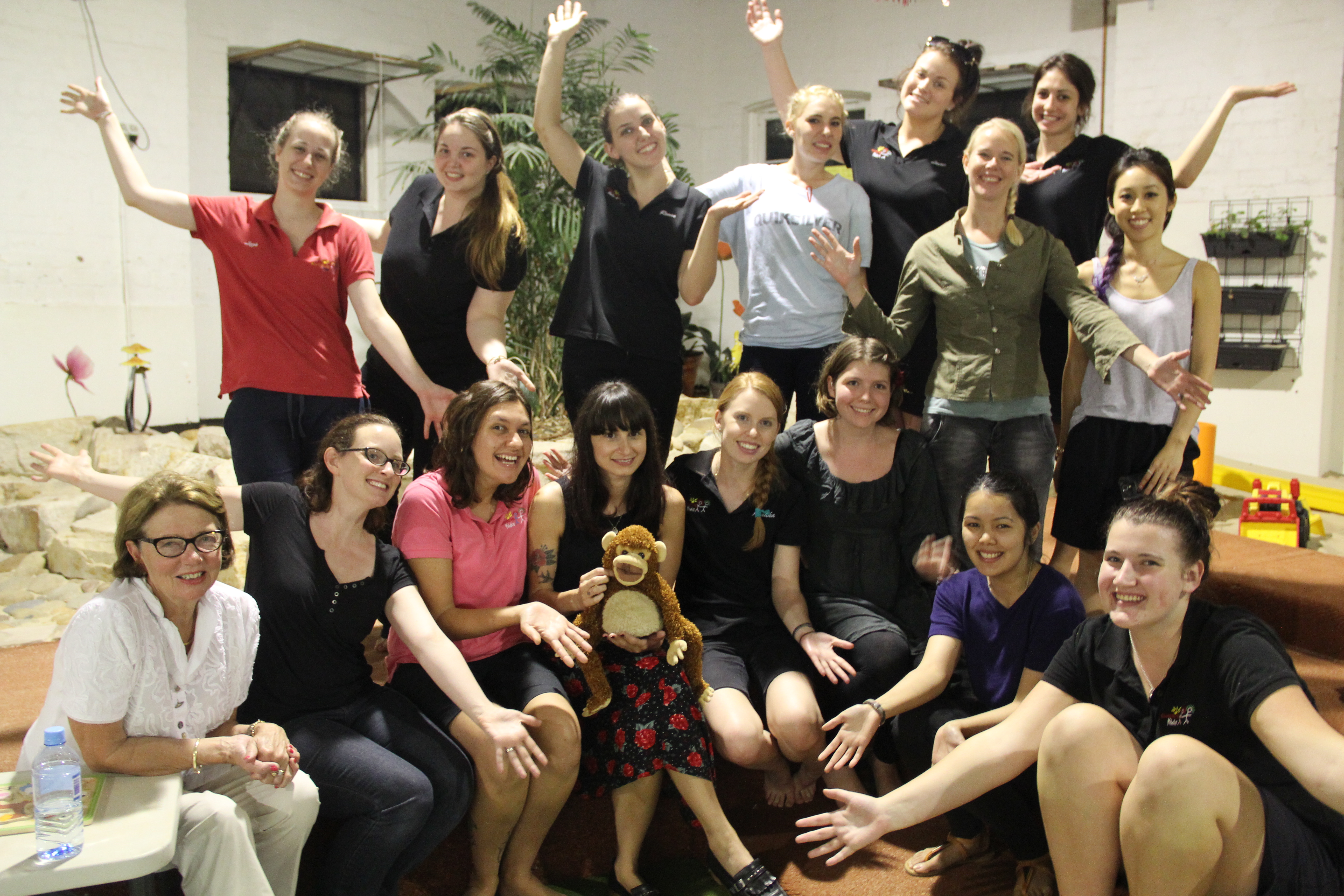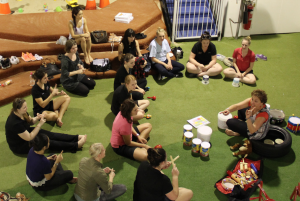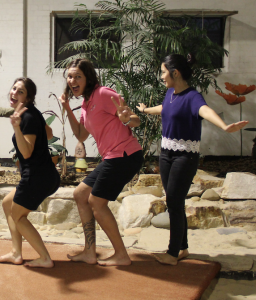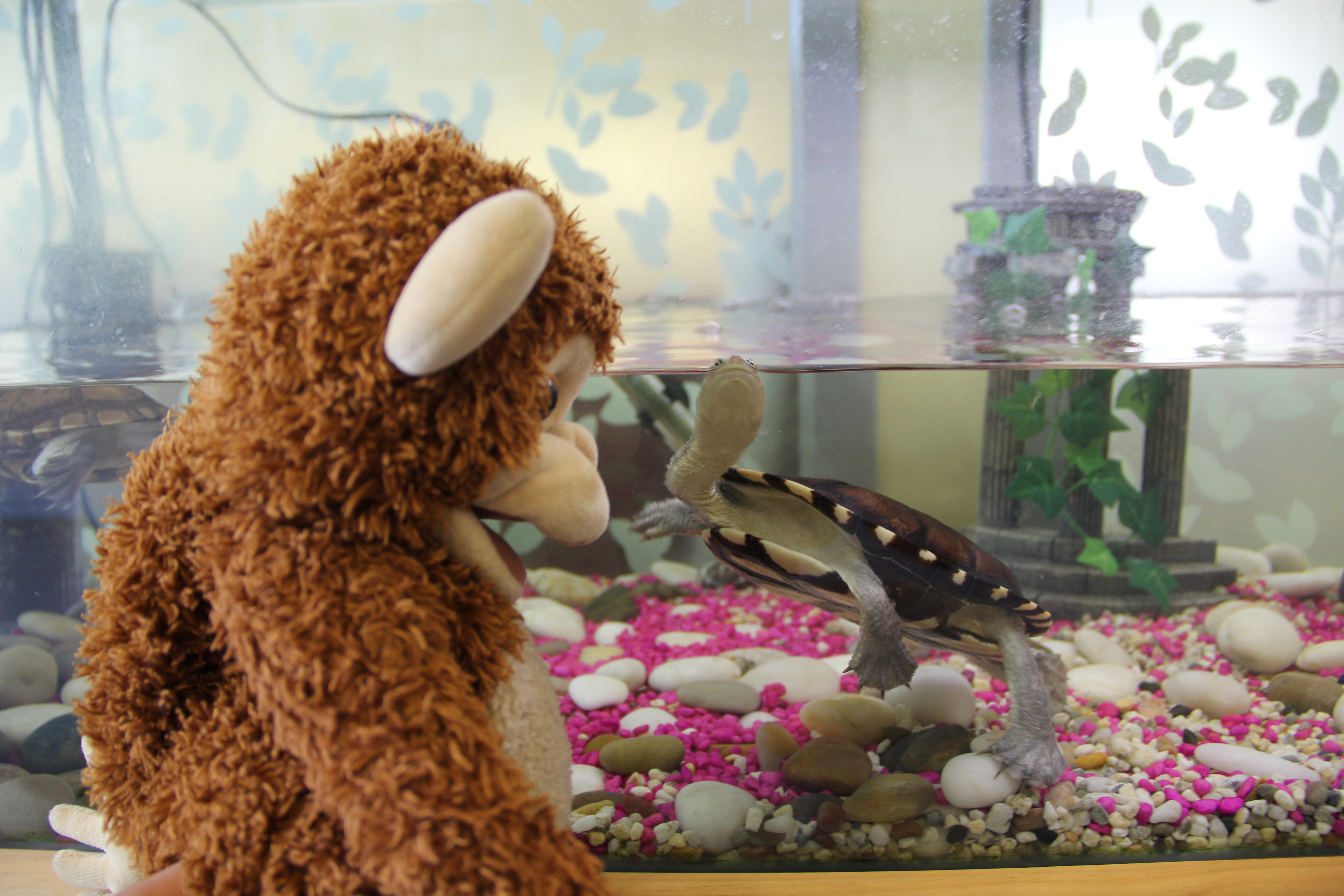Why Educators at Camperdown Sunshine Kids Educators Teach through Music & Wellbeing?
Early Childhood Educators at Camperdown Sunshine Kids, Sydney use Bonkers Beat Music & Bonkers Gym Wellbeing program as tools to enhance children’s development and a way to improve National Quality Standard Areas 1, 2, 4, 5, & 6.
Both programs cover many areas of children’s brain development and help educators to achieve better outcomes for children.
Singing, dancing, playing percussion instruments, transitional songs, yoga poses, morning wellbeing routines, breathing exercises, meditation stories and many other tools are incorporated into daily routines and became part of centre’s curriculum.
Professional development sessions allow all educators to have the opportunity to learn how to use music and wellbeing and link them to NQS and EYLF. These nights are always filled with fun, excitement and team spirit. Can’t wait to come back again in July to run ‘Harmony Night’ for all parents and educators in Camperdown Sunshine Kids. Before then, keep singing & stretching…
Loved this article about benefits of music for children’s development…
The Importance of Music for Children
by Jackie Silberg
Music researchers have found correlations between music making and some of the deepest workings of the human brain. Research has linked active music making with increased language discrimination and development, math ability, improved school grades, better-adjusted social behavior, and improvements in spatial-temporal reasoning, a cornerstone for problem solving.
Harvard psychologist Howard Gardner has theorized that humans have several different types of intelligences—logical-mathematical, linguistic, and interpersonal. He believes that music intelligence is equal in importance to all of them.
Why is music important for children?
Music helps develop children’s language skills: When young children listen to familiar words in songs, the neural transmitters in their brains are firing away, and their brains are building connections to the sounds they are hearing and the words they are singing. Singing songs and reciting poems and rhymes with children helps them develop early literacy skills.
Keeping a steady beat develops language. Clapping hands, stamping feet, and using rhythm instruments in time to music develops important pre-reading skills. Young children recognize words, sounds, rhythms, tones, and pitches long before they talk, sing, or dance. So, the more music your children have in their lives, the better they will speak and read.
Music helps develop children’s self-esteem: Music is a wonderful way to address the many needs of children because music is nonjudgmental. There is no right or wrong, it just is what it is. Listening to different types of music nurtures self-esteem and encourages creativity, self-confidence, and curiosity.
Music helps develop children’s listening skills: Music encourages the ability to listen and thus to concentrate. Songs encourage speech and auditory discrimination. Through music, children learn to hear tempos, dynamics, and melodies. Listening for loud and soft, up and down, fast and slow encourages auditory development in the brain.
Music helps develop children’s math skills: A simple song can include basic math skills such as counting, repeating patterns, and sequencing.
Music helps stimulate children’s brain connections: A recent study from the University of California found that music trains the brain for higher forms of thinking. For example, researchers believe that music affects spatial-temporal reasoning (the ability to see part-whole relationships).
A study conducted by psychologist Frances Rauscher of the University of Wisconsin at Oshkosh and physicist Gordon Shaw of the University of California at Irvine specifically links the study of music to necessary brain development. They demonstrated that preschoolers who were given early exposure to complex multi-sensory stimulation—in this case, musical keyboard lessons and group singing—scored higher on tests measuring spatial reasoning, a skill used later in math, science, and engineering.
Music and movement go together: Children naturally respond to music by moving and being active. Music helps children learn about rhythm and develop motor coordination.
Group dances like the Hokey Pokey help children learn about their body parts (“you put your right foot in,” “you put your left hand in…”), sense of direction (turning around, going left and right, moving back and forth), and rhythm patterns (clapping to the beat).
Music relieves stress: Stress can be relieved with songs, chants, finger plays, and moving to music. Singing together creates a feeling of safety and makes learning in a classroom much easier.
Music makes transitions easier: Getting children to move from one activity to another is easy when you sing a song. For example, sing to the tune of “The Farmer in the Dell,” “It’s time to go to lunch,” and you’ll see that the children will get ready much faster. Keep making up verses. “Let’s pick up the toys… Now let’s wash our hands,” etc.
Music encourages creativity in children: A fun game to play with children is changing the words to familiar songs. It is a wonderful way to develop the creative process. Remember in Alice in Wonderland by Lewis Carroll how the words of “Twinkle, Twinkle, Little Star” were changed to “Twinkle, Twinkle Little Bat?”
Choose a song that your child knows well. Some familiar songs are: “Old Macdonald,” “The Wheels on the Bus,” and “Skip to My Lou.”
You can sing, “Old Macdonald had a supermarket,” and sing about all the items in the supermarket. Make up a sound to go with the food (e.g. orange juice: slurp, slurp).
Music is a great way to teach children with special needs: Music is a fun way to teach all children, including children who have special learning needs. Music experiences can be an effective way to stimulate speech development, provide organization for cognitive and motor development, and create a meaningful environment for socialization.











